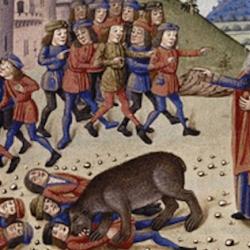The history of the Omrides during the ministry of Elisha takes a curious turn. Instead of confronting the king with his sin, as Elijah generally did, Elisha instead repeatedly gives assistance to the son of Ahab (2 Kings 3; 6-7). Jehoram wavers, sometimes whining, sometimes hostile to Elisha, ultimately respectful. One of the last times Jehoram appears, he is on his throne and passes wise and compassionate judgment on behalf of the Shunammite woman (2 Kings 8:1-6).
Yet, the very next thing Elisha does is predict the rise of Hazael (2 Kings 8:7ff.), the designated avenger against Ahab’s house (1 Kings 19), and soon after that Elisha sends one of the prophets to anoint Jehu to slaughter the members of the house of Ahab.
This is jarring: It would make sense if we were reading stories about Jehoram’s continual resistance to the kindness of Elisha. But we don’t. He is apparently mourning for the city (2 Kings 6:30), and he delivers justice. Just when the Omride dynasty is looking good, Yahweh releases the avenger. At a structural level, it’s another sign of the parallel between the Omrides and the Davidic dynasty; the latter too is judged just after the sterling reign of Josiah. In both cases, the dynasty’s future has been determined and the Lord is ready to act. At that point, the best any individual king can do is to delay the judgment for a generation. For Jehoram, not even that is possible.
It’s an Achan kind of thing: Had Achan confessed and repented as soon as Joshua started investigating his sin, he and his family might have been saved. But the time of repentance passes, and then it’s too late. Ahab in sackcloth gains a reprieve; Jehoram in sackcloth doesn’t.
If we read a bit more deeply, we can see that Jehoram is depicted in a less favorable light. He confesses that the Lord has brought disaster on Israel (2 Kings 3; 6), but he rarely turns to the only possible source of help – Elisha. Jehoshaphat is the one to ask for a prophet of Yahweh when the kings are in the wilderness without water (2 Kings 3); Jehoram did not think to sent Naaman to the prophet when the Aramean came seeking cleansing (2 Kgs. 5); instead of humbly asking Elisha to intercede during the famine in Samaria, he sends a delegation to kill him (2 Kings 6). The only faithful thing he does is to restore the Shunammite’s land. This is his one bit of genuine kingsmanship, and it’s too little and late to save his kingdom.















